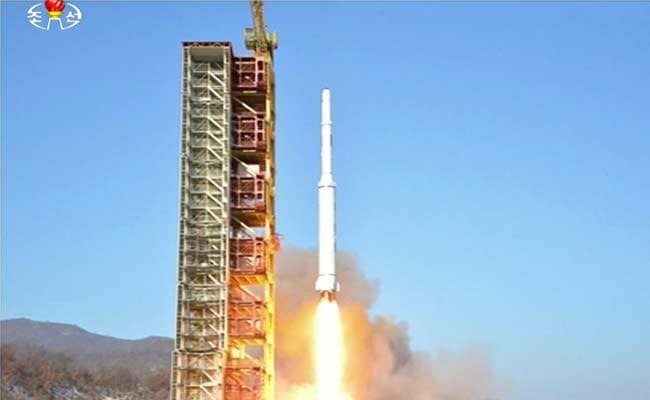
North Korea's rocket launch of earth observation satellite Kwangmyong 4 on February 7, 2016. (AFP Photo)
United Nations:
The United Nations Security Council began an emergency meeting on North Korea's rocket launch on Sunday and diplomats said they expected the 15-nation body to condemn Pyongyang and redouble efforts to agree on new sanctions.
Speaking to reporters ahead of the closed-door session, France's UN ambassador, Francois Delattre, described North Korea's launch of a long-range rocket on Sunday as an "outrageous provocation."
"That's why weakness is not an option," he said. Asked about plans for a Security Council resolution to impose sanctions following a North Korean nuclear test last month, Delattre said: "The sooner the better, the firmer the better."
British Foreign Secretary Philip Hammond said on Sunday he had spoken with his Japanese counterpart Fumio Kishida and both had agreed the Council should take strong action against North Korea.
Council diplomats said they expected it to issue a unanimous statement of condemnation on Sunday. They said that, in the coming days and weeks, Beijing and Washington would continue bilateral discussions on the outline of a new resolution to expand existing UN sanctions on North Korea.
Speaking on condition of anonymity, one senior Western diplomat said he hoped the council would be able to vote on a new sanctions resolution this month.
He said the Americans had been pushing for tough new measures that went beyond targeting North Korea's atomic weapons and missile programs, while China wanted any future steps to focus on the question of non-proliferation.
One diplomat told Reuters that Washington was hoping to tighten international restrictions on North Korea's banking system while Beijing was reluctant to support that for fear of worsening conditions in its impoverished neighbor.
Chinese Ambassador Liu Jieyi declined to comment to reporters when entering the council session, saying only that the council was "working very hard."
UN Secretary-General Ban Ki-moon on Saturday condemned the rocket launch and urged North Korea to "halt its provocative actions."
Pyongyang has been under UN sanctions because of its nuclear weapons program since it first tested an atomic device in 2006.
Speaking to reporters ahead of the closed-door session, France's UN ambassador, Francois Delattre, described North Korea's launch of a long-range rocket on Sunday as an "outrageous provocation."
"That's why weakness is not an option," he said. Asked about plans for a Security Council resolution to impose sanctions following a North Korean nuclear test last month, Delattre said: "The sooner the better, the firmer the better."
British Foreign Secretary Philip Hammond said on Sunday he had spoken with his Japanese counterpart Fumio Kishida and both had agreed the Council should take strong action against North Korea.
Council diplomats said they expected it to issue a unanimous statement of condemnation on Sunday. They said that, in the coming days and weeks, Beijing and Washington would continue bilateral discussions on the outline of a new resolution to expand existing UN sanctions on North Korea.
Speaking on condition of anonymity, one senior Western diplomat said he hoped the council would be able to vote on a new sanctions resolution this month.
He said the Americans had been pushing for tough new measures that went beyond targeting North Korea's atomic weapons and missile programs, while China wanted any future steps to focus on the question of non-proliferation.
One diplomat told Reuters that Washington was hoping to tighten international restrictions on North Korea's banking system while Beijing was reluctant to support that for fear of worsening conditions in its impoverished neighbor.
Chinese Ambassador Liu Jieyi declined to comment to reporters when entering the council session, saying only that the council was "working very hard."
UN Secretary-General Ban Ki-moon on Saturday condemned the rocket launch and urged North Korea to "halt its provocative actions."
Pyongyang has been under UN sanctions because of its nuclear weapons program since it first tested an atomic device in 2006.
© Thomson Reuters 2016
Track Latest News Live on NDTV.com and get news updates from India and around the world

